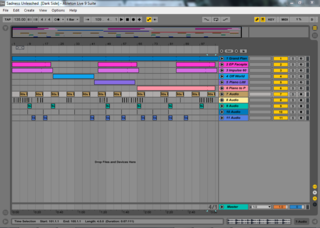A music sequencer is a device or application software that can record, edit, or play back music, by handling note and performance information in several forms, typically CV/Gate, MIDI, or Open Sound Control, and possibly audio and automation data for digital audio workstations (DAWs) and plug-ins.
Steinberg Media Technologies GmbH is a German musical software and hardware company based in Hamburg. It develops software for writing, recording, arranging and editing music, most notably Cubase, Nuendo, and Dorico. It also designs audio and MIDI hardware interfaces, controllers, and iOS/Android music apps including Cubasis. Steinberg created several industry standard music technologies including the Virtual Studio Technology (VST) format for plug-ins and the ASIO protocol. Steinberg has been a wholly owned subsidiary of Yamaha since 2005.

Virtual Studio Technology (VST) is an audio plug-in software interface that integrates software synthesizers and effects units into digital audio workstations. VST and similar technologies use digital signal processing to simulate traditional recording studio hardware in software. Thousands of plugins exist, both commercial and freeware, and many audio applications support VST under license from its creator, Steinberg.

Pro Tools is a digital audio workstation (DAW) developed and released by Avid Technology for Microsoft Windows and macOS. It is used for music creation and production, sound for picture and, more generally, sound recording, editing, and mastering processes.

A digital audio workstation is an electronic device or application software used for recording, editing and producing audio files. DAWs come in a wide variety of configurations from a single software program on a laptop, to an integrated stand-alone unit, all the way to a highly complex configuration of numerous components controlled by a central computer. Regardless of configuration, modern DAWs have a central interface that allows the user to alter and mix multiple recordings and tracks into a final produced piece.

Audio editing software is any software or computer program which allows editing and generating audio data. Audio editing software can be implemented completely or partly as a library, as a computer application, as a web application, or as a loadable kernel module. Wave editors are digital audio editors. There are many sources of software available to perform this function. Most can edit music, apply effects and filters, and adjust stereo channels.
Emagic was a music software and hardware company based in Rellingen, Germany and a satellite office in Grass Valley, California. On July 1, 2002 Emagic was bought by Apple Computer. Emagic's Windows-based product offerings were discontinued on September 30, 2002.

Novation Digital Music Systems Ltd. is a British musical equipment manufacturer, founded in 1992 by Ian Jannaway and Mark Thompson as Novation Electronic Music Systems. Today the company specializes in MIDI controllers with and without keyboards, both analog and virtual analog performance synthesizers, grid-based performance controllers, and audio interfaces. At present, Novation products are primarily manufactured in China.

Ableton Live is a digital audio workstation for macOS and Windows developed by the German company Ableton.

The MPU-401, where MPU stands for MIDI Processing Unit, is an important but now obsolete interface for connecting MIDI-equipped electronic music hardware to personal computers. It was designed by Roland Corporation, which also co-authored the MIDI standard.
Disposable Soft Synth Interface (DSSI) is a virtual instrument plugin architecture for use by music sequencer applications. It was designed for applications running under Linux, although there is nothing specific to Linux in the interface itself. It is distributed under the terms of a combination of LGPL-2.1-or-later and some BSD licenses, all of which are free software licences.

Logic Pro is a proprietary digital audio workstation (DAW) and MIDI sequencer software application for the macOS platform developed by Apple Inc. It was originally created in the early 1990s as Notator Logic, or Logic, by German software developer C-Lab which later went by Emagic. Apple acquired Emagic in 2002 and renamed Logic to Logic Pro. It was the second most popular DAW – after Ableton Live – according to a survey conducted in 2015.
M-Audio is a business unit of inMusic Brands that designs and markets audio and MIDI interfaces, keyboards and MIDI controllers, synthesizers, loudspeakers, studio monitors, digital DJ systems, microphones, and music software. The company has independent offices in the US, Canada, UK, Germany, France and Japan.

LMMS is a digital audio workstation application program. It allows music to be produced by arranging samples, synthesizing sounds, entering notes via computer keyboard or mouse or by playing on a MIDI keyboard, and combining the features of trackers and sequencers. It is free and open source software, written in Qt and released under GPL-2.0-or-later.

LV2 is a set of royalty-free open standards for music production plug-ins and matching host applications. It includes support for the synthesis and processing of digital audio and CV, events such as MIDI and OSC, and provides a free alternative to audio plug-in standards such as Virtual Studio Technology (VST) and Audio Units (AU).

The Roland SC-7 General MIDI Sound Module is a stand-alone MIDI synthesizer module by Roland Corporation. It was released in 1992. It supports the General MIDI System and can also be used as a MIDI interface for a computer. The Roland SC-7 provides the basic (capital) Roland Sound Canvas sounds in a compact design for stand-alone, IBM PC/AT or Apple Macintosh computer use.
The Soundscape R.Ed (1997–2001) was the second generation digital audio workstation manufactured by Soundscape Digital Technology Ltd. It was renamed the Soundscape 32 after Mackie acquired the product and continued to be available until around 2007.

B-Step Sequencer is a multitrack software MIDI step sequencer that is available as either a standalone application or in audio plug-in format. Primarily used to create melodical sequences to trigger soft or hardware synthesizer, whether in a studio environment or live on stage, it has a user interface based on pattern and TR music sequencers.











